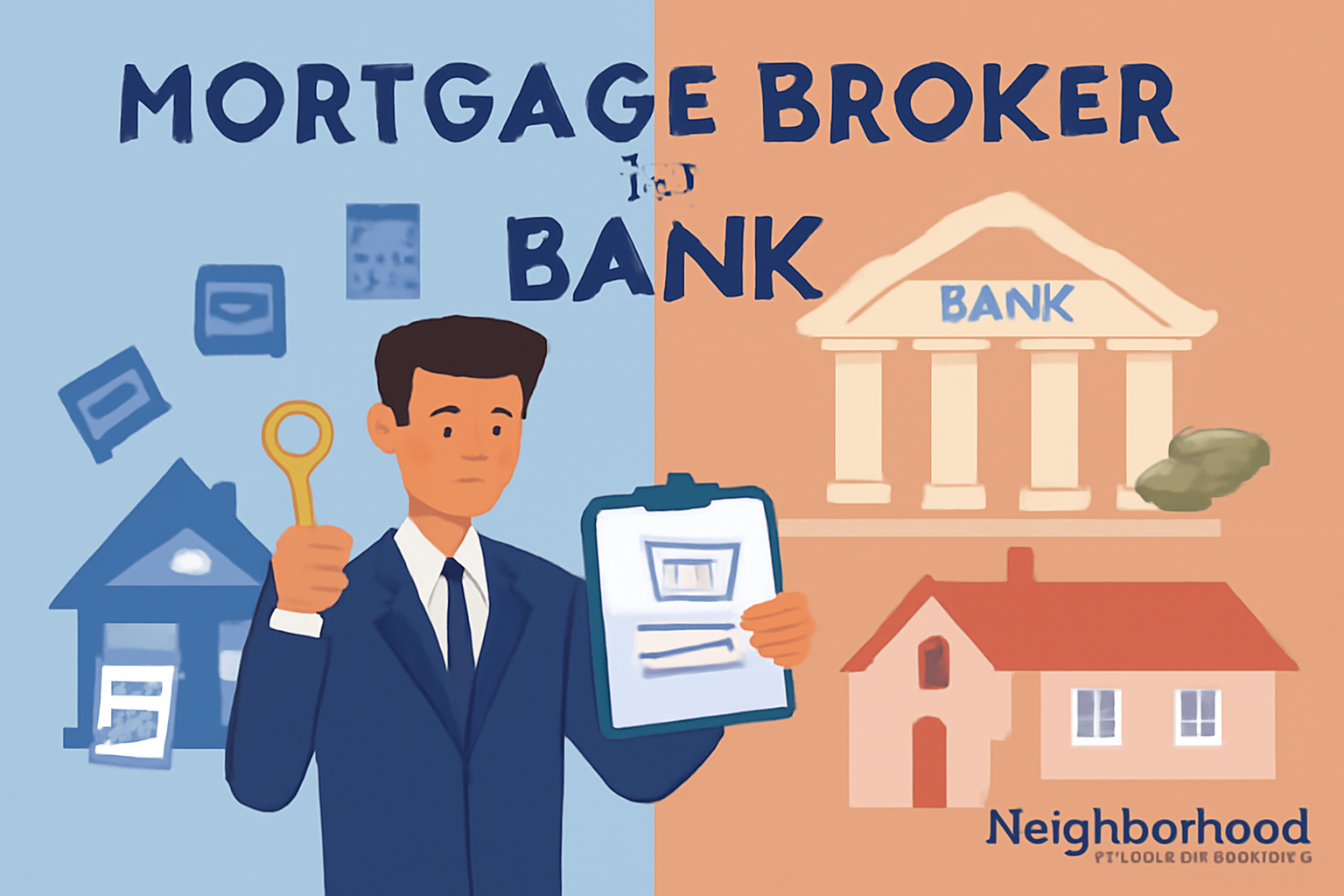Licensed in:
Mortgage Broker vs. Bank: What’s the Best Option for Homebuyers?
Wondering whether to use a mortgage broker or bank? Learn what a mortgage broker does, when it’s worth paying one, and how they compare to banks.

Buying a home is one of the most exciting—and sometimes overwhelming—moments in life. If you’re a first-time homebuyer, or even a seasoned buyer comparing your options, you’ve probably come across the choice between working with a mortgage broker vs. bank. Understanding the role of a mortgage broker and whether it’s worth paying one can save you time, money, and stress.
In this guide, we’ll explore what exactly a mortgage broker does, how they get paid, and when it makes sense to work with one versus going straight to a bank. By the end, you’ll be better equipped to make the right decision for your home buying journey.
Read also: Everything You Need to Know Before Buying a House
What Does a Mortgage Broker Do?
Think of a mortgage broker as your personal loan shopper. Unlike banks, which only offer their own mortgage products, a mortgage broker acts as an intermediary between you and a variety of lenders. Their job is to find the best loan options that fit your unique financial situation and homeownership goals.
Mortgage brokers help you by:
- Comparing loan products across multiple lenders to find competitive mortgage rates
- Guiding you through the pre-approval and application process
- Helping you understand complex loan terms and conditions
- Handling paperwork and communicating with lenders on your behalf
This level of service is especially valuable if your finances are a bit more complicated—like being self-employed, having multiple income sources, or needing special loan types such as FHA or VA loans.
How Does a Mortgage Broker Get Paid?
One common question is: Is it worth paying a mortgage broker? The answer often depends on how the broker is compensated.
Mortgage brokers typically earn a commission from the lender once your loan closes. This is usually a small percentage of the loan amount, often around 1% to 2%. Because the broker’s payment comes from the lender, many borrowers don’t pay the broker directly.
However, some brokers might charge a fee or upfront costs, so it’s important to ask about any potential charges before working with one. Brokers are legally required to disclose their fees, so you should have all the information before making a decision.
Mortgage Broker vs. Bank: What’s the Difference?
Working With a Bank
Banks offer mortgage products from their own portfolio. If you have an existing relationship with a bank, it might be convenient to apply there. Banks often have strict lending criteria and may not offer as many flexible options as brokers.
Working With a Mortgage Broker
Mortgage brokers provide access to a wide network of lenders, including banks, credit unions, and private lenders. This means they can shop around to find a loan that fits your needs best. They also tend to offer more personalized service, helping you navigate the often complex mortgage process.
Key Points to Consider:
| Aspect | Mortgage Broker | Bank |
| Loan Options | Wide variety from many lenders | Limited to bank’s own products |
| Personalized Help | High – tailored guidance and support | Moderate – standard banking services |
| Interest Rates | Often competitive due to lender network | May be less flexible |
| Convenience | May require more coordination | Convenient if you already bank there |
| Fees | Usually paid by lender, sometimes upfront | Typically none or rolled into loan fees |
When Should You Use a Mortgage Broker?
Choosing between a mortgage broker and a bank depends on your unique situation. Here’s when working with a mortgage broker makes the most sense:
- You’re a first-time homebuyer: Brokers can guide you through loan options specifically designed for first-timers, such as FHA or USDA loans.
- Your finances are complex: If you’re self-employed or have multiple income streams, brokers can find lenders more suited to your situation.
- You want to shop around easily: Instead of applying to multiple banks individually, brokers do the comparison for you.
- You’re looking for personalized service: Brokers provide one-on-one support throughout the loan process.
You want help finding competitive rates: Brokers can tap into wholesale rates not always available directly to consumers.
Frequently Asked Questions (FAQs)
What’s the difference between a mortgage broker and a bank?
A mortgage broker works with multiple lenders to find the best loan for you, while a bank offers only its own mortgage products.
How do I find the best mortgage broker near me?
Look for brokers with good reviews, transparent fees, and personalized service. Ask for recommendations and check credentials.
Are mortgage brokers more expensive than banks?
Often, no. Brokers typically get paid by lenders, so their service may come at no extra cost to you. Always ask about fees upfront.
Can a mortgage broker help with first-time homebuyer loans?
Yes! Brokers can help you find loan programs like FHA loans and guide you through eligibility requirements.
How long does it take to get a mortgage through a broker?
The timeline is similar to going through a bank—usually 30-45 days—but brokers can sometimes speed things up by managing multiple lenders.
Read also: How long it takes to buy a house
Conclusion: Is It Worth Paying a Mortgage Broker?
For many homebuyers, the convenience, personalized service, and access to better rates make paying a mortgage broker well worth it—especially when you consider the potential savings over the life of your loan.
That said, it’s important to clarify all fees upfront and understand how your broker is compensated. In many cases, using a mortgage broker can lead to better loan terms without additional out-of-pocket costs.